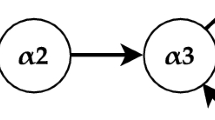Abstract
The purpose of this paper is to propose a formal description and implementation of a negotiation protocol between autonomous agents using persuasive argumentation. This protocol is designed to be simple and computationally efficient. The computational efficiency is achieved by specifying the protocol as a set of simple logical rules that software agents can easily combine. These latter are specified as a set of computational dialogue games about which agents can reason. The protocol converges by checking the termination conditions. The paper discusses the formal properties of the protocol and addresses, as proof of concept, the implementation issues using an agent-oriented platform equipped with logical programming mechanisms.
Similar content being viewed by others
References
Amgoud L, Maudet N, Parsons S (2000) Modelling dialogues using argumentation. In: Proceedings of 4th international conference on multi agent systems, pp 31–38
Amgoud L, Belabbes S, Prade H (2006) A formal general setting for dialogue protocols. In: Proceedings of artificial intelligence: methodology, systems, and applications, pp 13–23
Atkinson K, Bench-Capon T, McBurney P (2005) A dialogue game protocol for multi-agent argument over proposals for action. J AAMAS (Special issue on Argumentation in Multi-Agent Systems) 11(2): 153–171
Bench-Capon T, Atkinson K, McBurney P (2009) Altruism and agents: an argumentation based approach to designing agent decision mechanisms. In: Proceedings of the international joint conference on autonomous agents and multiagent systems (in press)
Bentahar J, Moulin B, Meyer J-J Ch, Chaib-draa B (2004) A logical model for commitment and argument network for agent communication (extended abstract) In: 3rd international joint conference on autonomous agents and multi-agent systems, pp 792–799
Bentahar J, Moulin B, Chaib-draa B (2005) Specifying and implementing a persuasion dialogue game using commitment and argument network. In: Argumentation in multi-agent systems, vol 3366(1). Springer, pp 130–148
Bentahar J, Moulin B, Meyer J-J Ch (2006) A tableau method for verifying dialogue game protocols for agent communication. In: Declarative agent languages and technologies, vol 3904. Springer, pp 223–244
Bentahar J, Maamar Z, Benslimane D, Thiran P (2007) An argumentation framework for communities of Web services. IEEE Intell Syst 22(6): 75–83
Brewka G (2001) Dynamic argument systems: a formal model of argumentation processes based on situation calculus. J Logic Comput 11(2): 257–282
Castelfranchi C (1995) Commitments: from individual intentions to groups and organizations. In: Proceedings of international conference on multi agent systems, pp 41–48
Dastani M, Hulstijn J, der Torre LV (2000) Negotiation protocols and dialogue games. In: Proceedings of Belgium/Dutch AI conference, pp 13–20
Dignum F (ed) (2003) Advances in agent communication. In: International workshop on agent communication languages. LNAI 2922, Springer
Dowling W, Gallier JH (1984) Linear-time algorithms for testing the satisfiability of propositional horn theories. J Logic Program 1(3): 267–284
Elvang-Goransson M, Fox J, Krause P (1993) Dialectic reasoning with inconsistent information. In: Proceedings of 9th conference on uncertainty in artificial intelligence, pp 114–121
Endriss U, Maudet N, Sadri F, Toni F (2003) Logic-based agent communication protocols. In: Dignum F (ed) Advances in agent communication. In: International workshop on agent communication languages. LNAI 2922, Springer, pp 91–107
Fornara N, Colombetti M (2003) Protocol specification using a commitment based ACL. In: Dastani M, Hulstijn J, der Torre LV (2000) Negotiation protocols and dialogue games. In: Proceedings of Belgium/Dutch AI conference, pp 108–127
Karunatillake NC, Jennings NR, Rahwan I, Norman TJ (2005) Argument-based negotiation in a social context. In: Proceedings of the international joint conference on autonomous agents and multi-agent systems, pp 1331–1332
Karunatillake NC, Jennings NR, Rahwan I, McBurney P (2009) Dialogue games that agents play within a society. Artif Intell (in press)
Kraus S, Sycara KP, Evenchik A (1998) Reaching agreements through argumentation: a logical model and implementation. Artif Intell 104(1–2): 1–69
Li C, Giampapa JA, Sycara KP (2006) Bilateral negotiation decisions with uncertain dynamic outside options. IEEE Trans Syst Man Cybern Part C 36(1): 31–44
McBurney P, Parsons S (2002) Games the agents play: A formal framework for dialogues between autonomous agents. J Logic, Lang Inf 11(3): 1–22
McBurney P, Parsons S, Wooldridge M (2002) Desiderata for agent argumentation protocols. In: International conference on autonomous agents and multi-agent systems, ACM Press, pp 402–409
Moulin B, Chaib-draa B (1996) Distributed artificial intelligence: an overview. In: Jennings N, O’Hare G (eds) Foundations of distributed artificial intelligence. Wiley, pp 3–55
Parsons S, Sierra C, Jennings N (1998) Agents tat reason and negotiate by arguing. J Logic Comput 8(3): 261–292
Prakken H (2001) Relating protocols for dynamic dispute with logics for defeasible argumentation. Synthese 127: 187–219
Rahwan I, Larson K (2008) Mechanism design for abstract argumentation. In: Proceedings of the international joint conference on autonomous agents and multiagent systems, pp 1031–1038
Rahwan I, Sonenberg L, Jennings NR, McBurney P (2007) STRATUM: a methodology for designing heuristic agent negotiation strategies. Appl Artif Intell 21(10)
Sadri F, Toni F, Torroni P (2001) Dialogues for negotiation: agent varieties and dialogue sequences. Intelligent agent series VIII, vol 2333 of LNAI. Springer, pp 405–421
Shakshuki E, Trudel A, Xu Y (2007) A multi-agent temporal constraint satisfaction system based on Allen’s interval algebra and probabilities. Int J Inf Technol Web Eng 2(2): 45–64
Sycara K (1998) Multiagent systems. AI Mag Am Assoc Artif Intell 19(2): 79–92
Sycara K, Pannu A, Williamson M, Zeng D, Decker K (1996) Distributed intelligent agents. IEEE Expert 11(6): 36–46
The Agent Oriented Software Group. Jack 4.1. 2005. http://www.agent-software.com/
Walton DN, Krabbe ECW (1995) Commitment in dialogue: basic concepts of interpersonal reasoning. State University of New York Press, NY
Wooldridge M (2003) Reasoning about rational agents. The MIT Press, Cambridge, MA
Author information
Authors and Affiliations
Corresponding author
Rights and permissions
About this article
Cite this article
Bentahar, J., Labban, J. An Argumentation-Driven Model for Flexible and Efficient Persuasive Negotiation. Group Decis Negot 20, 411–435 (2011). https://doi.org/10.1007/s10726-009-9163-0
Received:
Accepted:
Published:
Issue Date:
DOI: https://doi.org/10.1007/s10726-009-9163-0




